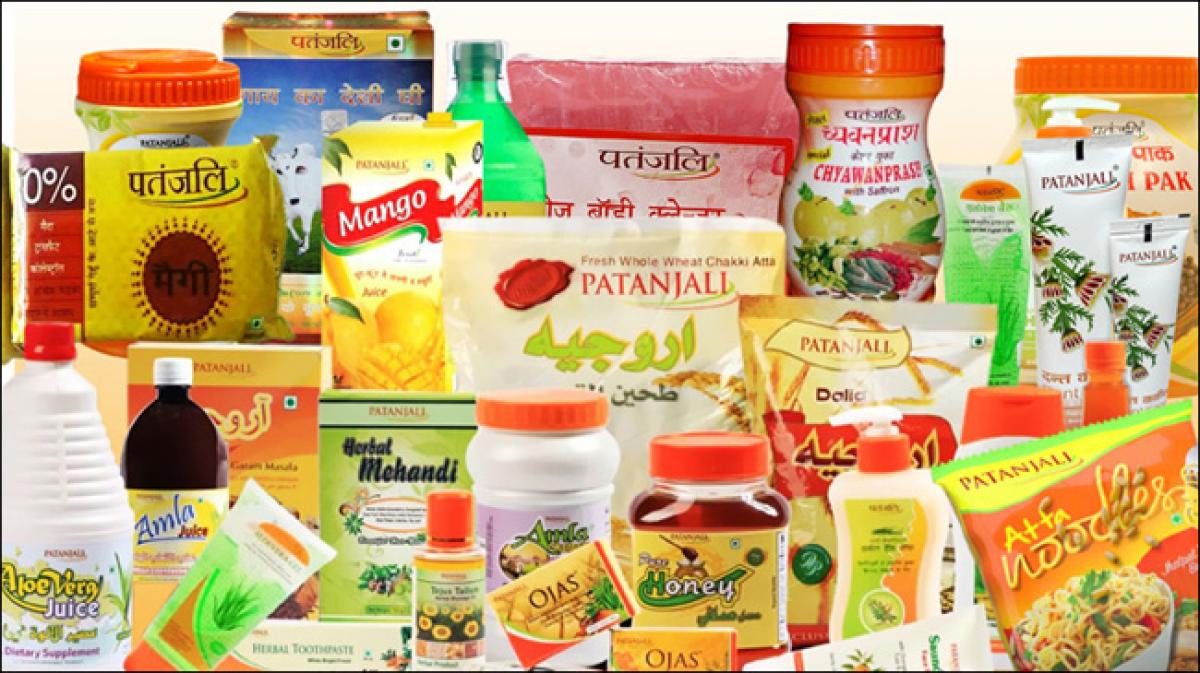Live
- Study Reveals Teabags Release Billions of Microplastics and Nanoplastics, Entering Your Body
- Workplace Wonders: Creative Secret Santa Gifts for Colleagues
- Kumbh Mela 2025: Essential Guide to Comfortable and Respectful Attire for Maha Kumbh
- Hyderabad Real Estate Faces Setback: Property Sales Drop 7% Year-on-Year in 2024
- Gnani’s Gen AI Solutions Revolutionising BFSI
- Congress Party Celebrates Christmas in Gadwal District with Unity and Joy
- Trump's WHO threat sparks debate on the efficiency of global health governance
- ICC Champions Trophy 2025 Schedule: India vs Pakistan Match Set for February 23 in Dubai
- Champions Trophy 2025: Full Schedule, Match Dates, Venues, Timings, and Updates
- FRAI Urges Government to Provide Technology Platform for Kirana Stores to Stay Competitive
Just In
Patanjali Ayurved Business growth driven by increasing demand for herbal products, brand image and new product pipeline


Patanjali, which started as a small pharmacy specializing in ayurvedic medicines, expanded to sell the full range of consumer categories, from edible oils, biscuits and noodles to toothpaste, hair, skin care products and groceries.
Patanjali, which started as a small pharmacy specializing in ayurvedic medicines, expanded to sell the full range of consumer categories, from edible oils, biscuits and noodles to toothpaste, hair, skin care products and groceries. According to Ramdev, the company is expected to cross Colgate this year, in terms of revenue and will overtake HUL within the next three to four years. Ramdev also claims that the company does not require glamorous advertising and marketing of its products as the product has the ability to sell itself unlike other FMCG companies.
Patanjali has around 30 products in its pipeline including a health drink, energy bar, cow milk powder, digestive biscuits, anti-ageing cream and moisturizing cream. In addition to this, they will also look to aggressively market their products through their e-commerce website, which has not been adopted by major FMCG giants. Colgate-Palmolive India has reported its worst sales growth in the last 44 quarters. Hindustan Unilever has also seen its revenue expand at a weak pace since the last six years. This trend is likely to continue in the future and estimates indicate that by 2020, FMCG giants can lose 3%-8% of their market share to Patanjali. In the toothpaste market, Colgate still remains the market leader but its market share has declined over the last two years. Ramdev led Patanjali has tied up with Future group to increase the penetration of its products and this venture result in intense competition between the two companies.
While Patanjali forays its way into the FMCG segment, other FMCG companies have not remained silent during the process. HUL has restructured its herbal brand “Ayush” by launching it online. In addition to this, an array of products ranging from hair-care, skin-care and pain balms have been launched on their e-commerce platform under Lever Ayush Therapy. Emami has acquired hair oil brand Kesh King last year in order to boost its presence in the herbal market. Godrej has launched a neem-based mosquito coil, hair color with coconut oil and various natural soaps. Colgate has also responded back to Patanjali’s entry with its aggressive marketing of the company’s active salt neem toothpaste. Himalaya has launched its new range of wellness products which aim to provide the end consumers with therapeutic solutions.
This indicates that both herbal and no-herbal companies are moving back to the start to figure out ways in which natural ingredients can be incorporated into their already existing products and new products.
“According to Research Analyst at Ken Research- “In addition to this, Patanjali must invest resources in order to improve its distribution network and effectively penetrate the rural and urban market by coming out with new product lines and using innovative packaging and design. Other FMCG giants must take notice of the growing trend towards the demand for herbal products and must establish its presence in the herbal segment. The FMCG market is a low-margin business with companies paying high costs for the procurement of raw materials. Hence, FMCG companies should cultivate their own raw materials or source them directly from farmers, thereby abolishing the intermediaries in the procurement process. In addition to this, FMCG giants can also adopt back to back product launch in the herbal segment to capture the growing potential of this market.”
The report titled “Company Profile of Patanjali Ayurved Limited – New Product Pipeline and Brand Image to Fuel Market Growth” provides a comprehensive analysis regarding the performance of the company and its FMCG’s in India and will help readers to identify the ongoing trends in the industry and anticipated growth in future depending upon changing industry dynamics in coming years. This report will help industry consultants, FMCG manufacturers, dealers, retail chains, potential entrants into the FMCG segment and other stakeholders to align their market centric strategies according to the ongoing and expected trends in the future.

© 2024 Hyderabad Media House Limited/The Hans India. All rights reserved. Powered by hocalwire.com






